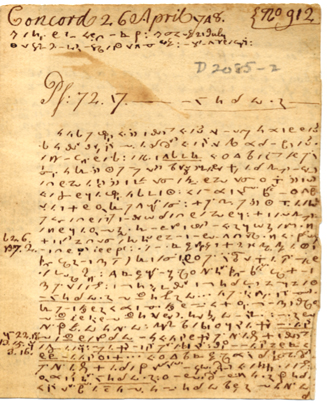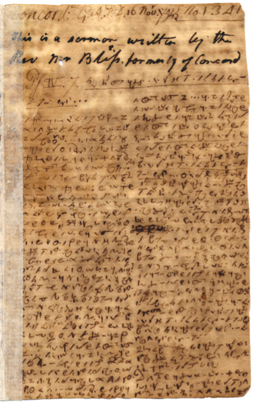 
|
DANIEL BLISS
2. Daniel Bliss. Holograph sermons, Concord, April 26, 1748
(on Psalms 72.17) and November 16, 1754 (on Psalms 4.7). Ink on paper.
1748 sermon from the collection of the Concord Antiquarian Society, presented
to the library in 1974.
Emerson’s great-grandfather Daniel Bliss (1715-1764), a 1732 graduate of Yale, was minister of the First Parish in Concord from 1739 to 1764. He succeeded John Whiting, who was forced to resign because of his fondness for alcohol. A New Light Congregationalist caught up in the Great Awakening revivalism preached by Jonathan Edwards, Bliss twice welcomed English evangelist George Whitefield to Concord, in 1741 and 1764. During Bliss’s ministry, there was considerable discord among his parishioners over his evangelical fervor, leading to the departure of a number—including John Whiting—who chose to worship separately at the Black Horse Tavern. (The tavern stood on the present site of the Concord Free Public Library.) Bliss was a powerful preacher. When George Whitefield preached here in 1764, Bliss’s abilities were judged by his congregation as at least equal to those of the more famous man. In his 1835 Concord bicentennial discourse, Ralph Waldo Emerson referred to the charges brought “by lovers of order and moderation” against Bliss as “a favorer of religious excitements.” Emerson’s perception of the “true piety” evident in Bliss’s response to these charges suggests the value he himself placed on deeply felt spirituality as contrasted with the conventional expressions of institutional religion. These two Daniel Bliss sermons are written in what appears to be a variety of Greek shorthand.
No image in this online display may be reproduced in any form, including electronic, without permission from the Curator of Special Collections of the Concord Free Public Library.
Next Entry - Previous Entry - Back to Section I Contents Listing - Back to Exhibition Introduction - Back to Exhibition Table of Contents |